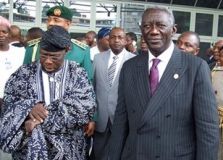Sudan snubbed for Africa leadership
Jan 29, 2007 (ADDIS ABABA) — Sudan lost its bid to assume the rotating leadership of the African Union to Ghana on Monday after regional leaders snubbed Khartoum for a second time because of international outrage over bloodshed in Darfur.
 Alpha Oumar Konare, the AU’s top diplomat, told reporters Ghanaian President John Kufuor would take the post of AU chairman. “By consensus it is President Kufuor.”
Alpha Oumar Konare, the AU’s top diplomat, told reporters Ghanaian President John Kufuor would take the post of AU chairman. “By consensus it is President Kufuor.”
He said Sudan had supported the decision, which avoided a damaging dispute that would have eclipsed the main summit agenda, including raising peacekeeping troops for Somalia.
Before the swift decision on Monday, some analysts had predicted the dispute over Sudan would dominate the summit and only be resolved at the last moment.
Delegates said a deal was worked out through the mediation of South African President Thabo Mbeki and a group of seven respected presidents or “wise men”.
The 2007 chairmanship was promised to Sudanese President Omar al-Bashir a year ago when he was passed over for the post because of the violence in Darfur, which experts estimate has killed 200,000 people and driven 2.5 million from their homes.
Critics say that far from abating, the violence has worsened in the last year and government-backed Arab militias have killed thousands.
Bashir has repeatedly blocked deployment of U.N. peacekeepers to bolster an overstretched African Union military mission of 7,000 soldiers and monitors.
Sudanese Foreign Minister Lama Kol told Reuters: “This was our suggestion. We voluntarily suggested this so that the foreign elements who were trying to divide the continent over this issue would not succeed … what was important was to take the decision for the unity of the continent.”
TRAGEDY
U.N. Secretary-General Ban Ki-moon told the summit a solution must be found to the “tragedy” of Darfur. “We must open a new and different chapter. The toll of the crisis remains unacceptable,” he said.
But despite lengthy talks with Bashir he failed to win commitments to deploy U.N. peacekeepers, a key demand of the United Nations and Western governments.
Sudan had seemed adamant on the eve of the summit that it should get the chairmanship despite a chorus of demands from rights organisations and Western governments that it be barred because of abuses in Darfur.
But as the summit began in the Ethiopian capital, pressure rose to prevent Khartoum from running the organisation whose overstretched force has been unable to stem the violence in Sudan’s vast west.
In his opening speech, Konare accused Khartoum of attacking civilians in Darfur, where Washington says genocide is taking place.
“We appeal to the government of Sudan to stop attacking and bombarding Darfur and instead restore peace,” he said.
Rights group Amnesty International said in a statement on the eve of the two-day summit that the AU would undermine its credibility if it gave the chairmanship to Bashir.
Chad, whose relations with Sudan are severely strained after the Darfur conflict spilled over their border, had vowed to withdraw from the AU if Bashir got the chair and Chadian President Idriss Deby praised the outcome.
“It is a very wise decision. You have to know it was unanimous. It is a decision that reassures not only Africans but also all of Africa’s partners,” he said.
Diplomats said Western governments lobbied vigorously in Addis Ababa against Sudan.
But U.S. Assistant Secretary of State Jendayi Frazer rejected Sudan’s accusations of Western pressure.
“I think that’s a mistake. The membership of the AU takes the decision about who will lead them. I think that they want leadership that reflects criteria they have within their own process, which includes democracies not at war,” she said.
Delegates said a compromise over Ghana, which is celebrating the 50th anniversary of its independence in 2007, offered a way out of the dilemma supported by consensus — the traditional African way of resolving disputes.
The summit is due to discuss raising a peacekeeping force for Somalia to replace Ethiopian troops, unrest in Guinea and climate change, as well as the AU military mission in Darfur.
Konare said in his speech that African leaders must urgently provide troops for the Somali peacekeeping mission.
“If African troops are not in place quickly, then there will be chaos,” he said.
“We need 8,000 soldiers, today we have hardly 4,000. We cannot simply wait for others to do the work in our place,” he added.
(Reuters)
